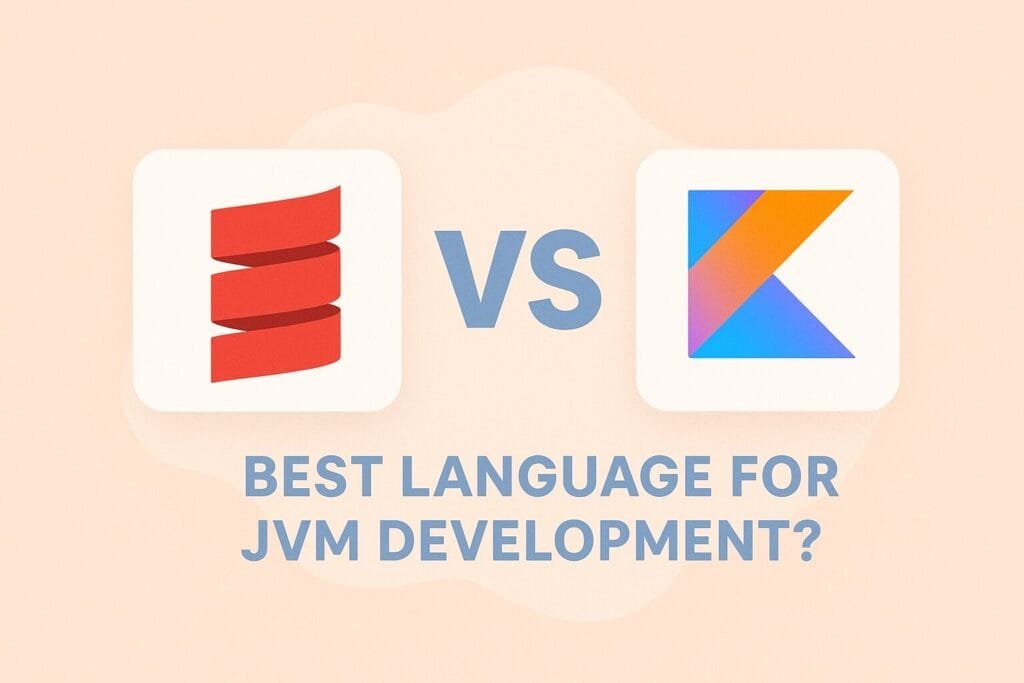When it comes to modern software development, developers working in the JVM (Java Virtual Machine) ecosystem are often faced with a choice between Scala and Kotlin. Both languages bring advanced features, powerful syntax, and excellent support for building scalable applications. But the question remains: which one is the best language for JVM development?
This article dives deep into the differences between Scala and Kotlin, examining performance, syntax, learning curve, ecosystem, and use cases. By the end, you will have a clearer understanding of which language might suit your project or career path better.

What is Scala?
Scala, introduced in 2004, is a general-purpose programming language that combines object-oriented and functional programming paradigms. Designed to address some of Java’s limitations, Scala allows developers to write concise yet highly expressive code. It is widely used in big data, distributed systems, and enterprise-level applications. Companies like Twitter, LinkedIn, and Airbnb have leveraged Scala for large-scale systems.
What is Kotlin?
Kotlin, created by JetBrains in 2011 and officially supported by Google for Android development in 2017, is designed to be fully interoperable with Java while offering more concise syntax and modern features. Kotlin has gained popularity for Android app development, backend systems, and even multiplatform projects. Companies such as Pinterest, Uber, and Coursera actively use Kotlin in production.
Scala vs Kotlin: Feature Comparison
Let’s break down the core features of both languages in a side-by-side comparison:
| Feature | Scala | Kotlin |
|---|---|---|
| Paradigm | Functional + Object-Oriented | Object-Oriented with Functional Features |
| Learning Curve | Steep, due to functional concepts | Gentle, easier for Java developers |
| Performance | Excellent for parallel and big data processing | Optimized for Android and backend systems |
| Tooling | Great support in IntelliJ IDEA, sbt, and Akka | Excellent IDE support, Gradle/Maven integration |
| Ecosystem | Strong in big data and distributed computing | Strong in Android, backend, and multiplatform |
| Community | Mature but niche | Fast-growing and backed by Google |
Use Cases for Scala
- Big Data applications (e.g., Apache Spark)
- Distributed systems
- Complex enterprise applications
- Academic and research projects in functional programming
Use Cases for Kotlin
- Android application development
- Server-side development (using Ktor or Spring Boot)
- Cross-platform development (Kotlin Multiplatform)
- General-purpose scripting and lightweight apps
Advantages of Scala
- Combines object-oriented and functional programming in one language.
- Powerful type inference and immutability support.
- Excellent for concurrent and parallel programming.
- Strong ecosystem with frameworks like Apache Spark.
Advantages of Kotlin
- Easy transition for Java developers with full interoperability.
- Concise and readable syntax reduces boilerplate code.
- First-class support for Android and multiplatform projects.
- Backed by JetBrains and officially supported by Google.
Challenges of Scala
- Steeper learning curve for beginners.
- Compilation speed can be slower compared to Kotlin.
- Smaller job market compared to Kotlin and Java.
Challenges of Kotlin
- Not as powerful for advanced functional programming as Scala.
- Still evolving in server-side and multiplatform areas.
- Performance in highly concurrent applications can be less efficient than Scala.
Which One Should You Choose?
The answer depends on your goals:
- If you are building Android apps or want a smooth Java alternative, Kotlin is the clear choice.
- If you are working on big data, distributed systems, or functional programming, Scala is the better option.
Conclusion
Both Scala and Kotlin are excellent choices for JVM development. Scala shines in functional and big data applications, while Kotlin is ideal for Android, backend, and multiplatform development. By understanding the strengths and weaknesses of each, you can choose the language that aligns best with your project requirements and career ambitions.
So, the real question isn’t just “Scala vs Kotlin: which is better?” but rather “Which language fits your specific use case?”

